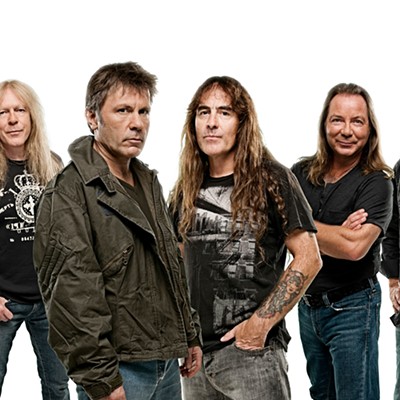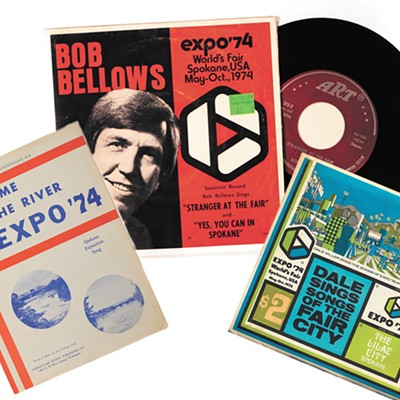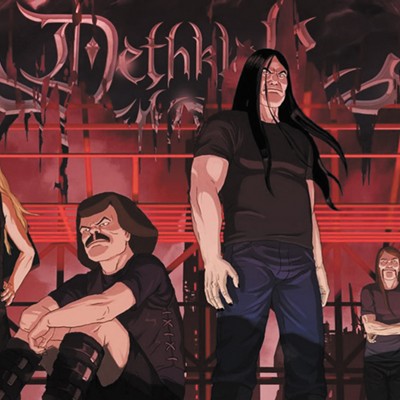Rumor has it that when Norwegian black metal band Mayhem found its singer dead from a self-inflicted gunshot wound, they took the strewn-about pieces of his skull and made them into necklaces. They took pictures of the corpse and the grisly scene surrounding it (one of those photos later ended up on a rare live bootleg).
Mayhem’s founding guitarist, Euronymous (who was murdered in 1993), said the rumors were true — except for the one about band eating the dead singer’s brains. That didn’t happen. But the rest? Yes, it did.
It’s the kind of stuff you hear when talking about Norwegian black metal. Murders, deaths, church arsons, Satanism — it’s all intrinsically tied to Norway’s largest musical export. And while some of the country’s bands have gotten caught up in the drama and “kult”-ishness, two Norwegian black metal outfits have achieved international status — and for completely different reasons.
Dimmu Borgir and Enslaved will share a stage this week. And though both bands sprouted from the same scene at around the same time, they couldn’t be more different. We pitted them against each other in our own little cage match to figure out who is the better band: the guys who are obsessed with bleeding crosses, or the hairy guys who look like Vikings? Quite the choice.
| ORIGINS | |
|
Dimmu Borgir, meaning “dark cities” or “dark castles/fortresses,” is named after an unusually shaped Icelandic lava field. The band formed in Oslo, Norway, in 1993, and its first EP, Inn i evighetens mrke, sold out in weeks. |
Enslaved started in 1991 in the small municipality of Sveio on the west coast of Norway. Grutle Kjellson was 17, and Ivar Bjrnson was only 13 years old. Their name comes from the title of a demo called Enslaved in Rot by Immortal. |
| IMAGE | |
|
You could argue Dimmu Borgir’s image is as much a part of the band as each member — which has become more and more prevalent over the course of the band’s career. At first, the guys really just looked like corpse-painted bikers. But over time, they’ve assumed Marilyn Manson-esque stage personalities. Lately, frontman Shagrath takes to the stage in a floor-length white coat, an Elder God mask, long black wig and, of course, his signature white face paint. This band is as serious as a heart attack. The drama is clearly not a joke. And depending on what kind of person you are, this band will scare the shit out of you or make you pee your pants laughing. |
Though Enslaved started as a black metal band, they’ve always seemed to eschew some of the more strictly visual elements of the genre. They have long hair and beards, but the band has never employed corpse paint like so many of their brethren. They look like a normal cadre of metal dudes dressed in denim and leather. And they’re big guys: Kjellson, Bjrnson and drummer Cato Bekkevold actually look like Vikings. This is probably not a good band to pick a fight with, even without their armor and battle-axes. |
| THEMES | |
|
Chances are if you put the entire Dimmu Borgir catalog on shuffle, whatever song comes up will likely be about Satanism, Christianity, dying or brooding (including their earlier stuff, which was all sung in Norwegian). That’s just what they’re into. The band conveys those themes in the goriest, bloodiest way possible. Take the video for “The Sacreligious Scorn” from 2007’s In Sorte Diaboli. In less than four minutes you will see pentagrams, burning crosses, bleeding crosses, corpsepainted Jesuses, scary Popes and bare-breasted goat-women. In their latest video for “Gateways,” bathtubs fill with blood, people levitate, and girls clutch doves and still-beating human hearts. That song comes from their newest album, Abrahadabra — a record laced with apocalyptic imagery and ponderings on the futility of mankind. Dimmu Borgir seems to see themselves as the brokers — intermediaries of sorts —between life and death, Satan and Christ, good and evil, symphonic and cacophonic. |
Norway has a rich pre-Christian history; Vikings were not just fierce, merciless raiders. They were also among the world’s most adventurous and well-traveled explorers. Enslaved uses their music and lyrics to hark back to those old ways, before Christianity burned its way across the Scandinavian frontier. Their first few records were sung in various Norwegian dialects, including Icelandic and Old Norse. Songs are predominantly about the myths and sagas that define Norwegian history. So while the band’s ideology is not necessarily Satanic in the sensationalized, vividly LaVeyan way, it is certainly adversarial. These Norwegians are still a little pissed off about being forcefully separated from their ancestral gods — pissed off and sad. That’s what’s unique about Enslaved’s music; it channels the full gamut of emotions so often missing in traditional “kult” black metal. There is some anger here, yes, but there is also a sense of separation anxiety, of abandonment and frustration. |
| TURNING POINT | |
|
Plagued by a constant rotating cast of members, each new set of members seems to have brought different sounds to Dimmu Borgir’s brand of metal. But it wasn’t until 2003’s Death Cult Armageddon they picked up the “symphonic” label with their collaboration with the Prague Philharmonic Orchestra. They continued to mash together classical and metal sounds on In Sorte Diaboli, but have reached new levels with Abrahadabra — a record not only featuring the three members of Dimmu Borgir, but more than 100 classical musicians as well. |
Fans, critics and the band universally agree that Enslaved’s crucial turning point came with the release of 2001’s Monumension. Not only was it the first album sung in English, it also marked a shift towards a more progressive sound, with more dramatic shifts in tempo and timing and an almost psychedelic atmosphere. It was the first, confident step towards evolving in the unclassifiable dimension they now occupy. |
Dimmu Borgir plays with Enslaved, Blood Red Throne and Dawn of Ashes • Mon, Nov. 22, at 7 pm • $20 - $23 • Knitting Factory • All-ages • http://www.ticketfly.com • 244-3279





















